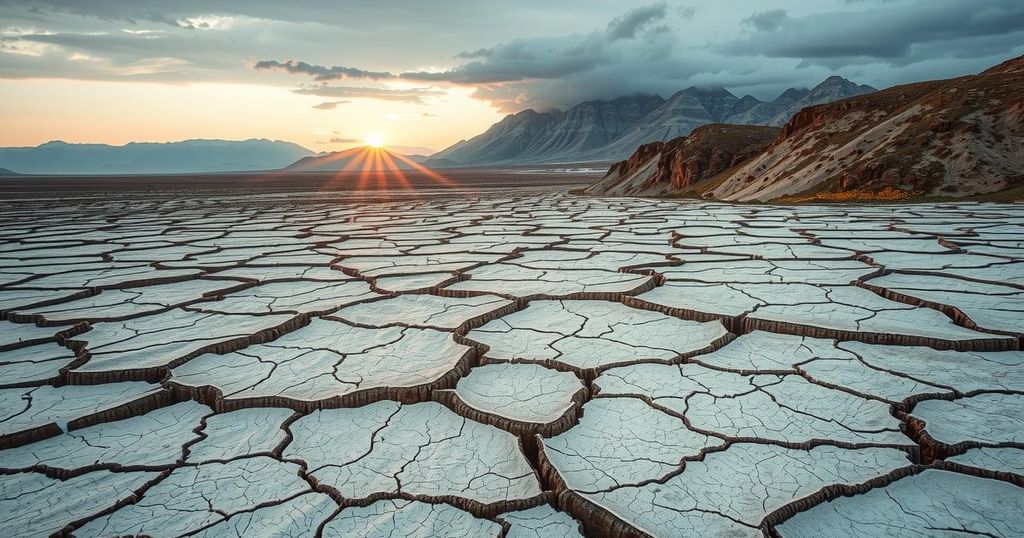World news
AMAZON, ANDREW MEDICHINI, AP, ASIA, CLIMATE CHANGE, DARKO VOJINOVIC, ED, EUROPE, FLOODING, FOOD SECURITY, IBRAHIM THIAW, ITALY, IVAN VALENCIA, NATURAL DISASTERS, RIYADH, SAUDI ARABIA, SERBIA, SICILY, U. N, UNITED NATIONS, UNITED NATIONS CONVENTION TO COMBAT DESERTIFICATION
Maya Ramirez
0 Comments
Global Lands Drying: Nations Gather in Riyadh to Address Crisis
Earth’s lands are experiencing severe drying due to climate change, impacting ecosystems and food security. A recent U.N. report predicts nearly five billion people could be affected by drought by century’s end. The Riyadh summit seeks effective responses and financial commitments to tackle these challenges.
The planet faces a significant drying of its lands, which has dire consequences for both plant and animal life. The United Nations recently released a report during the U.N. summit in Riyadh, Saudi Arabia, addressing the growing issue of desertification, a phenomenon driven by climate change, dwindling water supply, and deforestation. From 1970 to 2020, over three-quarters of the world’s land has experienced increasing aridity.
Ibrahim Thiaw, chief of the United Nations Convention to Combat Desertification, emphasized that these changing climates are permanent and will alter life as we know it. The summit currently focuses on how nations can effectively combat droughts—a recurring and acute water shortage—and the ongoing challenge of land degradation.
The report warns that if current global warming trends persist, by the end of this century, nearly five billion individuals will grapple with the impacts of land drying, particularly affecting regions in Europe, the western United States, Brazil, eastern Asia, and central Africa. Barron Orr, UNCCD’s chief scientist, cautioned that drier lands may lead to critical water shortages, with severe consequences for both humans and ecosystems.
Agricultural productivity is particularly at risk, threatening food security globally. As erratic rainfall and diminishing land quality impede economic development, migration often becomes a necessary survival strategy in the hardest-hit areas, particularly southern Europe, the Middle East, North Africa, and southern Asia.
At the Riyadh talks, negotiators discuss enhanced global responses to drought, acknowledging the contentious issue of whether affluent nations should financially support drought mitigation efforts internationally. Discussions revolve around funding for better monitoring systems and infrastructure to manage water resources during prolonged dry spells.
Saudi Arabia has pledged $2.15 billion in support from various international entities, while the Arab Coordination Group has committed $10 billion by 2030 to address desertification and drought challenges in 80 vulnerable nations. Despite the considerable financial implications—droughts cost the world $125 billion between 2007 and 2017—reaching consensus remains complex.
While immediate responses to drought are critical, Thiaw noted that long-term adaptative measures must also be prioritized. Countries should improve land management techniques, optimize water use efficiency, and implement effective crop irrigation systems. Enhanced monitoring and large-scale reforestation initiatives are also recommended as part of a comprehensive response to combat these pressing challenges.
The issue of drought requires an urgent international collaborative effort to preserve the environment and secure the livelihoods of countless individuals. The successful management of this crisis will need an unwavering commitment from nations to work together constructively for sustainable solutions.
The summit in Riyadh, Saudi Arabia, centers on combating desertification and addressing the global drying of lands exacerbated by human-induced climate change. The United Nations report highlights the alarming trend of increasing aridity globally, warning that if current emissions continue, billions will face increasingly harsh conditions. This leads to food insecurity, migration, and significant economic repercussions in regions already vulnerable to drought. The discussions at the summit focus on establishing effective strategies and collaborative solutions to mitigate these effects.
In summary, the ongoing U.N. talks in Riyadh signify a critical moment in addressing the global challenge of land desiccation. The findings underscore the urgent need for nations to unite in developing resilient strategies to combat drought and land degradation. As financial pledges from multiple nations emerge, the emphasis on coordinated international action is imperative to safeguard both human and ecological well-being in an increasingly arid world.
Original Source: apnews.com




Post Comment